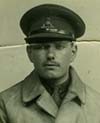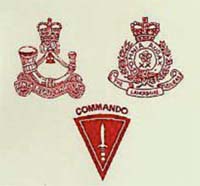|
I was born in 1916. My father
was farming at the time near Maidenhead. I was an only child and I went
to school at Haileybury College and I joined the Officer Cadet Corps there.
After school I went to Sandhurst.
I was very friendly with a boy who had lived in Lancashire and on all
the lectures we had we had to say our preferred regiment, the instructor
would call and when it came to Smale, I always said “undecided”,
I was waiting to find a good regiment and this friend of mine said “why
don’t you go into the Lancashire Fusiliers with me”? And that’s
what I did.
I joined in 1936 and I was put
on what they called a ‘NCOs cardre’ to teach NCOs and young
officers to be instructors and then I was posted to Colchester with the
Lancashire Fusiliers. I was very lucky that a very nice group of young
officers had started at the same time there with me and we used to play
rugger a lot at weekends.
B Coy 2 Bn Lancashire Fusiliers
Inter Company Bayonet Fencing Competition
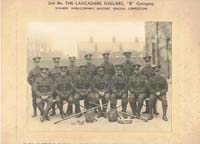
Back Row L to R. - L/c. McMordie, E. L/c. Heighway, J. L/c. Hilton,
H. Cpl. McMahon, T. Fus. Hamer, R. Fus. Farrell, J. Fus. Mayberry, K.
Seated - Cpl. Williams, J. Sgt. Bullen, F. Lieut. M. L. West. Major E.
G. Pullan, M.C. 2/Lieut. J. M. Smale. Sgt. Higson, J. L/c Joughin, F.
I was at Colchester when the
war broke out. First of all, we went to a sort of holding area in the
south of France and we set up a camp in an orchard. We had three different
platoons, one from each battalion of the brigade. There was the Lancashire
Reserve Platoon, with its own officer which was me, and there was an East
Surrey regiment Platoon and the Ox and Bucks Platoon and luckily we all
got on very well together.
We stayed there for a little
bit and then we moved up to a coal mining area, and we moved up to a place
on the German border, I think it was called Herent near Liège,
and from there we moved up to Brussels.
My company was put in a line
of houses overlooking a canal, and opposite the canal, there was a road
leading up to the canal and we thought that the German tanks would come
up that road. The local Belgian inhabitants were very anti-German too
and they had turned a bus upside down to prevent the tanks had coming
along. And anyway I thought I should make sure that there were no fifth
columnists in the houses down the road so l went through the houses and
they were alright. We got to one house, and the owner showed us round
and he was very cooperative, but he said “I would rather you didn’t
go into that bedroom because my old grandmother is very ill in bed there
and it won’t do her any good to have strangers coming in”. I
wondered if it could be an excuse and so I went in and sure enough it
was absolutely genuine and I felt awfully guilty about it.
We were in position and they
decided to withdraw us. We marched back towards the Escaut Canal and occupied
a farm building on a main road, directly opposite another farm. The Germans
came over, but fortunately they attacked the other farm first where another
company were and so we were alright.
There were ploughed fields between
us and the other farm and we saw somebody coming across and so we shouted
at him. He had a white flag and we thought he was one of our chaps who
had got away. So we called out to him, “Come on, you’re alright,
we won’t shoot you”. And he didn’t answer, he just kept
the white flag up. We kept on shouting “come on in you’ll be
alright” and he still didn’t answer. So in the end we fired
on the white flag and it went down so presumably we shot one of our own
chaps. Then the Germans came over the Escaut Canal and they started to
mortar our positions. They had sent a plane over so they knew exactly
where we were. It was a very hot day and I left my jacket where I had
been sitting and the jacket got riddled with shrapnel. So it was jolly
lucky that I wasn’t there!
Then we marched back. I had a
batman called Charlesworth, who’s quite a character, and he was marching
behind me and we had come across a sort of off licence where there was
a lot of French brandy, if we didn’t take it the Germans would have
done, so Charlesworth was walking behind me and every now and again he,
he would have a swig of this brandy, then passed it to me and I would
have a swig. We went on marching and we got a lift on a Royal Army Service
Corps truck for a while, but they had to go elsewhere and so we had to
continue on foot.
We were heading back towards
the coast, to Dunkirk. We passed through a place where we had been stationed
before and one of our lance corporals had married a local French girl
there, the daughter of a café owner. He picked her up, put her
in battle dress and she walked back with us dressed up as a man and she
was evacuated with us.
When we approached Dunkirk, we
didn’t have long to wait. We dug in as a company on the dunes and
a message came round saying all officers had to report to the divisional
commander, a First World War General who was very well thought of. He
was in a chalet on the dunes, and when we got there, it was clear he was
having a nervous breakdown and all he could say was “wear a hat!”
His assistant, a major, was a very sensible chap. He, he quickly stepped
in and got him out of the way and put him in a back room. And then he
took over and said, “we’re in touch by wireless with Dover and
they’re hoping to send over a destroyer tonight. My only advice to
you is to make your way down there”
And so I went back to the company,
but there was such a mass of men, I couldn’t find them so I was on
my own. I had to walk all night, about seventeen miles to Dunkirk, and
sure enough, a queue was just beginning to form, and I got in line and
boarded and I found a tyre and I sat on it. A petty officer came round
and said, “Sir, I’ve got orders to take your weapons off you
because we think the Germans may have infiltrated, dressed up in battle
dress, and so you must hand in your pistol”. Well, when I joined
the Army, we had to buy our uniform and pistol. It cost about seventeen
pounds!
We got back to Dover and there
were trains waiting for us. I expected that we were going to be booed
by the population because we were a beaten Army, but they were very, very
kind. It was a very long train, people were coming along with buff Red
Cross forms saying, ‘I am well, I am not well, I am wounded, I am
in hospital’, and we just crossed it out as, as appropriate. The
Red Cross brought us cups of tea as well.
We got back and we had a lot
of casualties, so when the battalion reformed on the south coast. A lot
of young boys, aged about eighteen, joined us. After working with wonderful
and efficient soldiers, all reservists with about five or six years regular
service in India, and a full and true sense of service, I found it frustrating
to find myself with these young boys learning elementary training on Bren
guns.
‘C’ Troop, No 3 Commando
in Plymouth, 1940.A subaltern friend and I saw an invitation to volunteer
for the Commandos and so off we went and I joined No 3 Commando. There
was a lot more intensive training and then we did the Guernsey raid.
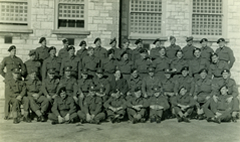
‘C’ Troop, No 3 Commando in Plymouth, 1940.
The Germans had only just occupied
Guernsey and Churchill was afraid that the Germans would follow up and
invade England. Our orders were simply to destroy as many installations
and kill as many of the enemy as we could.
Three Guernsey officers in civilian
clothes had been sent to spy out the land before the raid. We originally
intended to land further up the coast and one of these officers was to
be waiting for us at a pre-arranged place. The War Office hadn’t
given us much information about the Jedburgh peninsular, and we found
we had a very steep climb up a cliff. On the way up there was a house
and my troop commander, a RASC chap called de Crespney, thought it might
be a married quarter, so at two o’clock in the morning, with blackened
faces we banged on the door. A poor chap opened the door, he was absolutely
horrified and scared stiff, of course, and I think he probably shouted
or something so de Crespney locked him in the lavatory to get him out
of the way.
We found the old British barracks,
which was supposed to be occupied, but there were no soldiers there at
all, so I was given the job of making a sort of road block stop point
with a group of soldiers. We weren’t there for very long because
we had to be back by two o’clock.
Well, we got back to the rendezvous
point but we were delayed because the Navy couldn’t put in due to
the rocks and the information about the tide was wrong so we had to swim
out. I went into the sea fully clothed and I just managed to get to the
Navy boat, a sort of lifeboat thing, and I started to sink. I sank twice
and the third time I panicked. I thought, “Well, I won’t come
up this time”. So I panicked and shouted, “For Christ’s
sake, get me out”, and a naval officer jumped in fully clothed and
pulled me out and saved my life.
It was a shambles. We put out
in this boat to join the destroyer but we were overdue and the destroyer
couldn’t wait any longer because it was thought they would be caught
in the open channel by enemy aircraft at sunrise and so they were just
beginning to push off. Luckily Durnford-Slater had a compass and a pocket
torch and the boat crew saw the light from the torch and that saved us
otherwise we would have been left out in the boat.
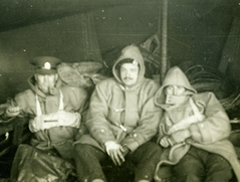
Training at sea. Dartmouth, 1940. |
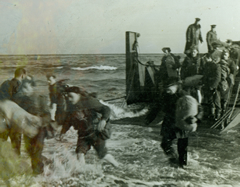
Landing on Arran, Christmas 1940. A training exercise. |
Training at sea. Dartmouth,
1940. Landing on Arran, Christmas 1940. A training exercise.
My next Commando action, the
Lofoten Raid, was on a lovely sunny day. There was only one very brave
chap who opened up on us as we went ashore and we split up into groups.
The main objective was to destroy a factory there helping the German war
effort with fish oil that they used in explosives. I didn’t have
a particular objective, just to walk around and see if there were any
Germans hiding anywhere.
We had to look all over the place
but there was no sign of the enemy so Lieutenant Wills found the post
office and sent a telegram to Herr Hitler, Berlin, saying, “You said
no-one would land in German territory unopposed, well here we are and
where are you?”
We were told we weren’t
to bring back any woman, which was a silly thing really; the Norwegian
civilians didn’t want to leave the women in an occupied country.
When we were loading the boats with the Norwegians who wanted to leave,
a few women and girls approached and I said, “Sorry but you can’t
get in.” We had been given strict orders. They went to the next boat
and the chap there was much more sympathetic and he said, “Get in
and hide yourselves under a blanket.”
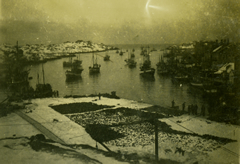
The raid on the Lofoten islands. |

The raid on the Lofoten islands. |
The raid on the Lofoten islands.
The raid on the Lofoten islands.
I can’t remember taking
any Prisoners of War or Quislings but when we were back on the ship, I
remember one German prisoner. They didn’t have a cell for him, I’m
sad to say, so they put him in a big bathroom. I was the orderly officer
and I checked on him from time to time, he also had a sentry on the door,
and when I came round he was very polite and held no animosity towards
me at all. He knew I was just doing my job.
We got back and it was a bit
of an anti climax because it was back to training. My chaps were saying,
“Look we’ve been in action, we know we’re good soldiers,
we have done what we were asked to do and we don’t need any more
training.” I went to Durnford-Slater with an article that had been
in the paper about Newfoundland lumberjacks working in Scotland at Balmoral.
I asked if we could go down and join them to keep my men occupied. He
said, “Yes, by all means, if they’re prepared to take you then
good luck to you.” So we went up there. Durnford-Slater took the
view that if you weren’t doing anything, you might as well be on
leave.
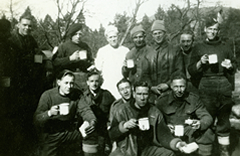
Major Smale and his men working as lumberjacks before training
for Dieppe. |
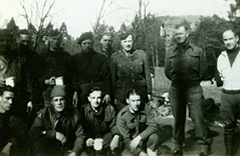
Major Smale and his men working as lumberjacks before training
for Dieppe. |
Dieppe and
Captivity.
Soon, we were training for the
Dieppe raid but I caught measles so I was put into a local cottage hospital
for three weeks. The Americans had just joined the war and I could see
some from the hospital. I remember watching them training very hard, running
up a hillside and zigzagging about. I was very impressed, they were very
keen.
I just recovered in time for
the raid. Of course, we didn’t know what or where it was, there was
no particular or specific training. A day or two before we left we were
shown a cloth model of the countryside and they pointed to the exact landing
areas and what the terrain looked like. A group of us were coming back
in the same train compartment and one chap shouted out, “I know where
we are going, it’s Dieppe!” Durnford-Slater was absolutely furious
with him and said, “If I let you come on the raid, you’ll come
with your Sergeant in charge, you won’t be in charge of a boat. You
will not lead any men.” The story went that he was so disappointed,
he walked off the end of the ship and died during the raid.
They told us the main raid would
be done by the Canadians on Dieppe itself and there would be British Commandos
in support on either side. The Canadians were all volunteers and I felt
they weren’t very well trained, really. They were very loyal and
had enlisted specially to come over. About a thousand of these Canadians
were to attack the main town of Dieppe and they suffered terrible casualties
there. No 3 Commando was on the left flank, where I was, and No 4, commanded
by Lord Lovatt, was on the right.
We had been told by Durnford-Slater
that we should land at all costs that was impressed on us very hard. Our
main convoy ran into a German convoy of ships of some sort and although
they were dispersed, one of our naval officers went round and got shot
up quite a bit. Another naval officer went round, he was very good, he
got any boats that could still sail, or were movable, he got them away.
We were heading for the outskirts to a place called Berneval which was
a small village. I was standing up in front with the coxswain and a naval
and out of the mist a German armed trawler appeared and opened fire on
us and they tried to ram us. Luckily, as they came towards us one of my
corporals, a chap called Gerard, was lying on the floor (We were all lying
on the floor because of this German ship) and he managed to put on the
brake and so they misjudged where to fire. We slowed up and they just
missed us. They shot right past us
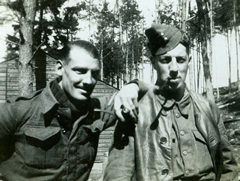
Cpl Gerard, left.
We were about ten miles out from
the beach. I saw the trawler coming back and it was going to hit us so
we had to abandon ship. I thought I’d have a jolly good try at swimming
the ten miles to the shore, and I was luckily in the calmer current, there
was another current which was a very rough current and nobody could survive
in that.
I got my boots off straightaway
because of my experience in Guernsey, I knew my boots would pull me down
so I got them off straightaway and we jumped overboard. Gerard had not
taken his boots off and I said to him, “Have you got your boots off,
Gerard”? He said, “No, I can’t them off because the laces
have shrunk”, and I held him up as long as I could and then eventually,
after several hours holding his head above the water, I found he had died
in my arms. It was a terrible experience.
As I was being washed down the
slow current, I ran into a chap. He appeared out of the mist and I said,
“Hello, good morning who are you?” Then he said he said, “I
am an American pilot. I came over to England to fight with the ‘Eagle
Frogs’”, he had just been shot down. Later on, I ran into a
rubber boat with three or four Germans who must have been had been shot
down and I thought, “I shall wave to them to see if they will let
join them”, but they, quite rightly, thought that if I came aboard
I would upset the boat and I think I would have done the same in their
position. They pushed off in the other direction and wouldn’t help
me, of course.
It was cold but I was very, very
fit at the time. I think it was probably because I was so fit that I was
alright.
By the time I got washed into
Dieppe harbour itself, another of these German armed trawlers appeared
and they put a boat down to pick me up. I thought, “They are going
to knock me over the head and kill me”, but they were very good and
they brought me to their mother ship, which was another of these armed
trawlers with a little place where the officer did his navigation from.
I sat on a kind of rope there and the officer waved to me and said, “Come
up and see me”, I didn’t realise how tired I was and when I
started to climb the ladder and I just collapsed and passed out completely.
The German Navy was very good, they took me ashore and I was put in a
temporary German hospital which they had put up for casualties of the
raid.
I found this Dieppe hospital
was over-crowded when I woke up the following morning. The hospital produced
a pair of battle dress trousers, I suppose the previous owner no longer
needed them and I think I dried my shirt; they must have provided boots
and socks but I don’t remember this.
We were cared for by French nurses
and I asked one if she could help me to escape. She looked rather frightened
and said it would be better to wait until I got to an established camp
where they would have the necessary facilities. This let her off the hook
but I had every intention to try to escape, we had been instructed to
make an attempt as soon as possible after capture before the German anti-escape
organisation could be organised. Some lorry-loads of POWs were being sent
to Rouen, about 10 miles away, and I joined hem the day after capture.
Having got to Rouen they did not know where to drop us off, but finally
decided on the Police Station. The Police did not welcome us and so we
were moved to an area of grass outside the hospital. I enquired about
being admitted to the hospital but was told I should need to have an anti-tetanus
injection in my stomach so I decided against it.
Later that day we were moved
on foot to the railway station and I remember seeing an elderly French
couple waving to us and giving the “V” sign from their window.
They tried to hide their action from the Germans but I caught their eye
as I passed. I tried to collapse on the ground, hoping to get separated
from the marching column, but got kicked to my feet. We were eventually
loaded into cattle trucks and moved off.
The other POWs were Canadians,
I don’t remember any other British at this time, and I asked if any
of them had any escaping kit (we had files and small compasses sewn into
our battledress). But no-one seemed to have anything.
Our destination was an established
camp on the outskirts of Paris. It was called Verneuil. We arrived there
in the morning and spent most of the day sitting in an open field outside
the camp. I remember water in pails being brought but I don’t recall
having any food. Later in the afternoon we were admitted to the camp after
being searched. Despite telling me otherwise, some people had large and
heavy army compasses and they tried to bury them outside the search hut.
The Germans must have found these with little trouble afterwards. We were
then billeted in the Nissen huts which had bunk beds. I think food must
have been provided, but don’t remember anything, except the French
Red Cross sent in some tins of sardines, only “for French Canadians”.
The Senior French Canadian Officer refused to accept them on these terms
saying that they should be for all Canadians and insisted that his officers
shared them with all the POWs (including, of course, the British). The
only British prisoners were from No 3 and No 4 Commando plus a Royal Navy
Officer and 2 Royal Marines. While we were eating these sardines, the
Canadian Brigadier returned from an interview with the Germans to find
that no sardines had been kept for him. The ration had worked out as only
one sardine per man. The Brigadier, of course, asked for his sardine and
was told that I had eaten it! This was a complete cover up as they had
forgotten to include him while they were sharing out and I was British,
so they thought was not under his orders. He believed his men and later
who later, when we were in Germany, he said to me one day: “It was
you who ate my sardine at Verneuil, wasn’t it?”
I chummed up with a British Royal
Marine called Houghton and we planned to try and get through the wire
that night. When the time came to leave the hut, it was raining hard and
I decided not to go (my injured arm was starting to give me a lot of trouble)
however Houghton went out, but later he returned as he thought that the
wire was electrified.
The following morning we were
looking across at the soldiers’ huts – we had been separated
from the soldiers on capture – and some Lancashire Fusiliers who
had joined the Commando with me and had served in the same Battalion at
Dunkirk spotted me and shouted “Up the twentieth!” This was
the Regimental shout we gave at football matches etc as the Regiment had
been known as the XXth of foot before county names were given to infantry
regiments.
Later that day one of the Canadians
returned from the doctors’ surgery and told me that there was another
Smale there (he must have been sleeping in another hut.) I went over and
found my cousin Ken Smale, who was a Marine. He had been serving with
the Royal Marine Commando and had landed on the main beach at Dieppe.
After a few days we were moved
by train to Germany and during this period my left arm started swelling
due to blood poisoning caused by the blue coloured strap on my life jacket
cutting into my arm. I was kept in the camp hospital, staffed by both
British / Canadian & German doctors until being sent, with a few other
men, to a proper POW hospital at a place called Freising. Another of 3
Commando, Geoff Osmond, who was wounded in the arm also came and we had
four German soldiers as escort.
We had to change trains at Munich
and there was a few hours wait. Geoff Osmond and I sat on a bench seat
on the station and watched the crowds. A middle aged woman came and sat
on the same bench with us; after she left we noticed she had left a cigarette
package on the bench so Geoff, being a smoker, opened it up and we found
she had written a note and left it inside the package. It was in English
and said something like, “Sorry to see you here”.
Freising hospital had been a
nunnery and nuns still acted as nurses. It was clean and well run, but
appeared to be short of materials. There were paper bandages and two meals
only a day – a brunch at 11.30 and main meal at 5.30. We were in
a large ward with a couple of other Allied prisoners including a religious
non-combatant captured in Norway, a Rhodesian pilot and a few Poles. The
Poles refused to speak to the Germans except on medical matters. The hospital
had not been known to the Red Cross until our arrival and Red Cross medical
parcels which included ovaltine, brandy etc as well as normal medical
supplies were sent for us. We had to sign for these parcels and these
signatures were sent to the Red Cross in Geneva, the first news that we
had been captured.
A German surgeon lanced my arm
and released the poison and I returned to the main camp OFLAG VII B at
Eichstatt after about 3 weeks.
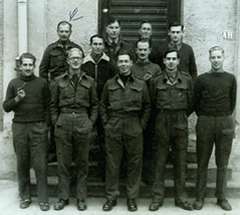
Major Smale with fellow prisoners at Eichstatt |
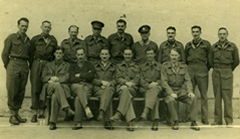
Major Smale with fellow prisoners at
Eichstatt
|
As we returned to the camp we
were interviewed by a British security officer to see if we had noticed
any Army camps or Anti-Aircraft Guns while travelling by train. Any such
information would be sent back to the War Office in code with POWs letters.
Soon, the handcuffing started.
We were put into one barrack block together but we found we could get
out of by knocking a nail down the hasps. After a time the Germans realised
we were taking the cuffs off as they came in at 9pm to unlock them only
to find some prisoners had already got into bed and put their cuffs back
on. Then they tried putting a German soldier in each room in the evening.
During the winter of 1943/44
I took part in building a tunnel. We called them ‘Tom’, ‘Dick’
and ‘Harry’, and ours was ‘Tom’. I think the RAF’s
was ‘Dick’ but I’m not sure. You could volunteer to help
on the escape attempts, though most people spent their time working for
qualifications – learning to be estate agents and solicitors and
things like that. I worked on the tunnel.
It was just like a rabbit warren
and the entrance was very small, you had to drop down. It was hidden behind
the lavatory, and one chap was given the job of putting the dust back
all around the seat of the lavatory. Some prisoners, Canadian engineers,
had experience of mining and they made all the plans and worked out how
far we could go.
We worked in shifts. When it
was your shift you went down and you removed the toilet and there was
a sheer drop of about ten or fifteen feet. We kept some dirty old ‘long
johns’ and vests and you had to put on the vest and the ‘long
johns’, and then you went down the tunnel and crawled along, it was
a hell of a job. You would dig until you needed a break and then you would
rest in one of the lay bys.
We used bed boards to secure
the tunnel and so everyone slept on very few bed boards, but a lot of
people didn’t take much interest in the escape attempts. They were
busy training to be solicitors and things. They got correspondence courses
sent out to them.
I remember on one occasion some
chaps got out, they had passes which had been sent out from England by
MI9,I think it was called, the escaping organisation which helped them,
and, and they showed these on a train and the ticket examiner was a prewar
policeman and not necessarily a Nazi, and he said, he said, “In the
circumstances it’s such a good pass that I would have not have recognised
it, but it’s been signed by a man who was handed over on January
the first, but if it hadn’t been for that I would have let you through”.
I lived in the room which opposite
the room where the camp security officer would send codes back to the
War Office through the Red Cross.
As the Allies approached Germany,
the British authorities sent codes telling us we were going to be moved
and sure enough, the Germans moved us back to a place called Moosburg,
a big central camp. They marched us out, along a road and the Americans
came over shot us up. They shot and wounded about twelve people right
at the last minute and one of them was a professional violinist and he
had lost his arm. It was a terrible thing to happen.
John eventually arrived at Moosburg
to find the German guards had fled leaving the prisoners to guard themselves
until they were liberated. After the War John stayed in the Army till
1958 and he became a Citizen d’Honeur of the village of Berneval
|

